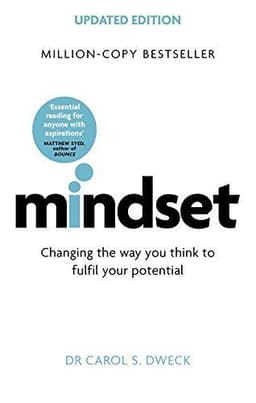
Mindset Book Summary
The New Psychology of Success
Book by Carol Dweck
Feeling Lazy?Read 1 Minute Summary
Summary
Mindset reveals the power of our beliefs to shape our lives, and shows how adopting a growth mindset - the belief that abilities can be developed through dedication and hard work - can help us achieve more than we ever thought possible in every area of life.
Sign in to rate
Average Rating: 5
Two Mindsets That Shape Our Lives
Dweck proposes that there are two basic mindsets that profoundly influence how we lead our lives - the fixed mindset and the growth mindset. In the fixed mindset, people believe that their qualities and abilities are carved in stone and cannot be changed in any meaningful way. The growth mindset is based on the belief that your basic qualities are things you can cultivate and develop through effort and practice. The view you adopt for yourself profoundly affects the way you lead your life.
Section: 1, Chapter: 1
The Power Of Yet
"Not yet. That's the point. You can still learn. It's not about immediate perfection. It's about learning something over time: confronting a challenge and making progress."
Section: 1, Chapter: 1
Mindsets Influence Relationships And Personal Development
Be aware of how your mindset is influencing your relationships. A growth mindset allows you to appreciate your partner's (or friend's, family member's etc.) ability to grow and change. It also allows for more open communication and ability to deal with conflict.
Recognize that you have a choice in which mindset to adopt. Even if you tend towards a fixed mindset, you can consciously choose to take a growth mindset approach to your abilities, relationships and life in general. Regularly reflect on your mindset and course-correct as needed.
Section: 1, Chapter: 2
Growth-Minded People Embrace Challenges
People with a growth mindset eagerly take on challenges and view failures and setbacks as opportunities for learning and development. They understand that effort and practice are the path to mastery. On the other hand, fixed mindset people shy away from challenges and feel discouraged and defensive in the face of failure. To them, failure indicates lack of ability rather than a need for more learning and effort.
Section: 1, Chapter: 2
Mindset And Relationships Case Study
eck shares the example of Charlene and Max, a couple with compatible interests and attraction but differing expectations in relationships.
- Charlene had a fixed mindset about relationships, believing that a good relationship should be perfect and effortless.
- When Max's moody tendencies emerged, Charlene saw it as an inherent flaw rather than something they could work through together.
- They broke up because they believed their incompatibilities meant the relationship wasn't "meant to be", rather than an opportunity for understanding and growth.
This case study illustrates how a fixed mindset can sabotage relationships.
Section: 1, Chapter: 2
The Dangers Of The Fixed Mindset
Be careful of falling into the traps of the fixed mindset:
- Avoid viewing your abilities and traits as permanent and unalterable. Just because you failed or struggled with something doesn't mean you are "no good at it" now and forever.
- Don't let a need to prove yourself stop you from learning and growing. Prioritize improving your abilities over protecting your ego.
- Don't get discouraged by failure or let it define you. Failure is an event, not a permanent identity.
Section: 1, Chapter: 2
The Myth Of Natural Talent
Many people believe in "naturals" - people endowed with abilities that unfold effortlessly. However, research shows this is largely a myth:
- Prodigies like Mozart had put in extraordinary effort and practice from a very early age. Their special status came from focused early training, not from being born special.
- Charles Darwin was viewed as an ordinary child and only became the revolutionary scientist through years of dedicated work and overcoming challenges.
- "Natural talent" perpetuates a fixed mindset that actually limits the potential of talented people by making them risk-averse and vulnerable to failure.
The truth is, great accomplishment comes through extraordinary effort and persistence, not innate ability. But the myth of natural talent persists because people prefer the idea of giftedness to the "drudgery" of effort
Section: 1, Chapter: 3
Praise The Process, Not Innate Ability
How we praise children profoundly influences their mindset. Praising children's innate abilities ("You're so smart!") reinforces a fixed mindset, while praising their effort, strategies and progress cultivates a growth mindset. Effects of different praise on children:
Ability praise:
- Makes children feel good in the moment but discourages risk-taking and learning
- Leads kids to fear failure and quit in the face of challenges
- Makes kids dishonest about their mistakes in order to maintain the "smart" label
Process praise:
- Encourages kids to seek challenges and persist despite failures
- Makes kids more resilient and likely to improve after setbacks
- Fosters intellectual honesty and openness to feedback
Section: 1, Chapter: 3
The Myth Of The Natural Athlete
In the world of sports, the idea of innate talent is pervasive. Coaches, scouts, and fans are always on the lookout for "naturals" who seem to effortlessly excel. However, examined more closely, the stories of many sports greats like Muhammad Ali, Michael Jordan, Babe Ruth, and Wilma Rudolph reveal that their success came through extraordinary dedication and training, not just inborn gifts. The "natural talent" view belongs to the fixed mindset and ignores these athletes' incredible growth through practice and perseverance.
Section: 1, Chapter: 4
John McEnroe And The Fixed Mindset In Sports
Tennis great John McEnroe is a prime example of a fixed mindset athlete.
- McEnroe believed he should win because of his talent and got furious when he didn't. He blamed losses on everything but his own effort.
- His need to prove his superiority made him arrogant and combative with umpires, opponents, and even fans.
- After losses, McEnroe vowed he would redouble his efforts in training, but rarely did. He believed he should be able to win on talent alone.
- By contrast, rival Jimmy Connors had a growth mindset, relishing hard work and using failures to improve his game.
Section: 1, Chapter: 4
Character Versus Talent In Sports
Great champions have talent, but the crucial ingredient to success is character, or the growth mindset in action. This includes:
- Passionate commitment to learning and improving every day
- Willingness to embrace challenges and persist through failures
- Confidence that effort will pay off in the long run
- Humility to know that your full potential is unknown and expanding
As coach John Wooden put it: "Ability may get you to the top, but it takes character to keep you there." Focusing on talent while neglecting character development is the core problem of the fixed mindset in sports.
Section: 1, Chapter: 4
Cultivate A Growth Mindset In Sports And Beyond
- Redefine success as giving your full effort and using challenges to improve. Don't focus solely on winning or perfection.
- Study the greats in your field and the immense work they put in to get to the top. Dispel the myth that their success was due to innate gifts that you lack.
- View failures and challenges as opportunities to learn and grow. Focus on what you will do next time to improve rather than dwelling on the failure itself.
- Commit to daily practice and learning. Constantly look for ways to improve your craft, even in areas of strength.
Section: 1, Chapter: 4
Jim Collins' Study Of Mindset And Corporate Success
Researcher Jim Collins studied companies that made the leap from good to great and found striking mindset differences between their leaders and those of comparison companies:
Fixed mindset leaders:
- Concerned with being seen as geniuses and validators
- Surround themselves with worshipers rather than honest critics
- React to problems with denial and blaming others
- Rarely develop deep leadership bench strength in the organization
Growth mindset leaders:
- Ambitious for company success, not personal glory
- Surround themselves with the most able people
- Confront problems directly and honestly
- Develop deep leadership talent throughout the ranks
Section: 1, Chapter: 5
Groupthink And Lack Of Innovation In Fixed Mindset Organizations
Fixed mindset thinking at NASA contributed to the Challenger space shuttle disaster:
- Leaders believed NASA's past successes were due to their innate engineering genius rather than careful safety protocols.
- They became overconfident and ignored warnings about Challenger's O-ring safety hazards.
- Dissenters were seen as disloyal and sidelined. Groupthink overtook safety concerns.
- Fixing the O-ring problem was seen as an admission that they weren't the perfect engineers they believed themselves to be.
The fixed mindset culture caused leaders to prioritize protecting NASA's genius reputation over confronting and solving safety problems, with tragic results.
Section: 1, Chapter: 5
Mindset And Romantic Relationships
Mindsets strongly influence the course of romantic relationships. Fixed mindset individuals often believe their ideal mate will put them on a pedestal, make them feel perfect, and complete them. They look for a soulmate whose mind they can read and who agrees with them on everything. Conflicts and rough patches are seen as signs that the relationship is destined to fail. Growth mindset individuals see their partner as a separate person with their own needs who can grow and change. They expect to work through conflicts and use them as opportunities to get closer. Communication is seen as key to a successful relationship.
Section: 1, Chapter: 6
Blame And Conflict In Fixed Mindset Relationships
Fixed mindset couples often descend into blame and conflict when problems emerge.
- They assume that disagreements mean their relationship is not "meant to be" because they expect perfect compatibility.
- They assign negative traits like selfishness or insensitivity to their partner's actions rather than looking at the situational factors.
- They believe their partner cannot change, so conflicts and disappointments lead to resentment rather than efforts to improve the relationship.
- They prioritize protecting their ego and sense of rightness over the health of the relationship.
These tendencies lead to a destructive cycle of judgment and escalating conflict that poisons many fixed mindset relationships.
Section: 1, Chapter: 6
Shyness And The Growth Mindset
Dweck's research shows that mindset influences how people experience and deal with shyness:
- Growth mindset individuals still get nervous in social situations but see them as challenges to be overcome rather than threats.
- After the initial awkwardness passes, growth mindset individuals engage more fully in social interactions and are rated as more enjoyable to talk to.
- Fixed mindset individuals often stay trapped in their shyness, avoiding social situations and dwelling on fears of judgment and rejection.
- Over time, growth mindset individuals expand their social comfort zones through practice, while fixed mindset individuals' comfort zones shrink. While shyness is never fully erased, having a growth mindset makes it more manageable and prevents it from becoming paralyzing.
Section: 1, Chapter: 6
Where Do Mindsets Come From?
The mindsets of children are profoundly influenced by the way their parents and teachers talk to them and treat them. Even subtle word choices and actions can send the message that traits are fixed or that growth is possible and expected.
- Praising children's talent or intelligence conveys a fixed mindset, while praising their efforts, strategies, and progress cultivates a growth mindset.
- Focusing on outcomes (like grades or winning) fosters a fixed mindset, while emphasizing learning and improvement promotes a growth mindset.
- Comforting children by saying a task was extremely difficult implicitly tells them they lack ability, while linking failure to lack of effort or poor strategy preserves their confidence in their potential.
Section: 1, Chapter: 7
Mindset And Social Emotional Learning
Haim Ginott, a child psychologist, shares a story illustrating how adult reactions shape children's self-concept and emotional resilience:
- 5-year-old Jessica was drawing a picture but became frustrated and tore it up. Her mother's response was "Oh honey, you were doing so well! I'm so sorry you messed it up."
- This taught Jessica that success is fragile and can be ruined by mistakes. Her mother unwittingly instilled a fixed mindset and catastrophic thinking.
- If instead her mother had said "It's so frustrating when drawings don't turn out the way we want. I usually take a break and try again later. Can I help you tape it back together?", she would have conveyed that mistakes are fixable and effort yields improvement.
Well-intentioned parents often inadvertently promote fixed mindset thinking in their attempts to be supportive.
Section: 1, Chapter: 7
Cultivate Growth Mindset Parenting, Teaching, And Coaching
- Praise the process (effort, strategies, persistence) rather than ability. Say things like "I'm proud of how hard you studied for that test" rather than "You're so smart!"
- Treat failure as an opportunity to learn and improve. Ask "What did you try? What could you try next?" rather than reassuring children that the task was impossibly difficult.
- Emphasize that brains and talent are just the starting point. Teach children that dedication and resilience are the keys to success in the long run.
- Explicitly teach children about brain plasticity and the growth mindset. Have them think about areas where they once struggled but now excel due to effort.
- When children succeed, express pride not in their abilities but in their commitment to learning and improving.
Section: 1, Chapter: 7
The Nature Of Change
Changing from a fixed to a growth mindset is a gradual process, not an overnight transformation. People often have a mix of both mindsets and must repeatedly choose the growth mindset in challenging situations. Change requires:
- Awareness of one's current mindset and how it is affecting thoughts and actions
- Conscious effort to respond to challenges with a growth mindset
- Realistic expectations that change is difficult and setbacks are inevitable
- Treating relapses into fixed mindset thinking as temporary rather than signs of failure
True change comes from altering self-talk and behavior over time, not simply professing a growth mindset philosophy.
Section: 1, Chapter: 8
Mindset And Social Issues
A growth mindset can be a powerful force for social change:
- Many societal inequities stem from the fixed mindset belief that certain groups have innately lower abilities. A growth mindset reveals the role of systemic barriers and unequal opportunities.
- The fixed mindset creates a culture of judgment and blame toward disadvantaged groups. The growth mindset emphasizes potential and focuses on creating supportive environments.
- Students from marginalized backgrounds often internalize societal fixed mindset messages, believing they are inferior. Teaching them a growth mindset can unleash their confidence and drive to succeed.
- Growth mindset interventions have been shown to close achievement gaps between racial and socioeconomic groups. Fostering a growth mindset on a societal level could reduce prejudice, increase social mobility, and create a more equitable world.
Section: 1, Chapter: 8
Related Content


David and Goliath Book Summary
Malcolm Gladwell
In David and Goliath, Malcolm Gladwell challenges our assumptions about power, advantage, and success, showing how underdogs can triumph by turning their weaknesses into strengths and exploiting the hidden vulnerabilities of the powerful.
In David and Goliath, Malcolm Gladwell challenges our assumptions about power, advantage, and success, showing how underdogs can triumph by turning their weaknesses into strengths and exploiting the hidden vulnerabilities of the powerful.
Psychology
Business
Sociology

